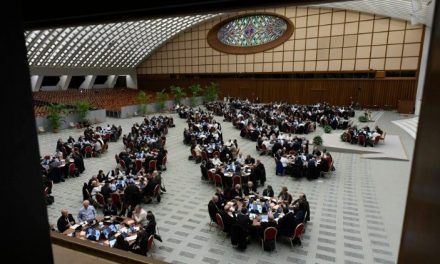My focus is in bioethics. So in the classroom, a conference, or even on an airplane when someone asks me what I do, the name Terri Schiavo often comes up. “What do you think of her?” I’m asked. “Isn’t she just a vegetable? What’s the point of keeping her alive?”
My first response to this, no matter how often I hear it (and I hear it a lot), is to get angry. Those who are mentally disabled such that they are dismissed as being in a persistent “vegetative” state deserve our special consideration and protection. They are a classic example of a vulnerable population whose dignity is inconvenient for those in power who would prefer them to remain invisible. To dismiss them as “vegetables” is the result of something I am tempted to call bigotry.
Should I call those who disagree with me “bigots”? Should I invoke the example of Jesus speaking truth to power in defense of vulnerable populations? Would I be guilty of being “neutral” if I didn’t label my opponent a “bigot” and dismiss their position as unworthy of being engaged?
I think not. Calling my opponent a bigot in this case puts him on the defensive and invites an aggressive response. Using the label also allows me to dismiss and marginalize his point of view, and doesn’t challenge any blind spot I might have in my own point of view. Furthermore, it actually perpetuates my opponent’s position, because he can now go back to his community with assurances that those who hold my position are not only unserious, but even lack basic charity. So we are the ones unworthy of being engaged.
So goes our horrifically vicious cycle of disengaged polarization.
We see it all the time, but we saw it in particular with race and abortion last weekend. Yesterday, I wrote an article that tried to highlight some problems with the use of labels in these situations. I began with the rush to judgment of George Zimmerman as a racist:
Especially when it comes to race, the label often hides much more than it reveals. It can even push people even to lie and distort the facts to fit the preordained racialized story. Zimmerman, a Hispanic, continues to be described as “white” in many news outlets. NBC News cut the audio tape of Zimmerman’s phone call to give the false impression he described Martin as “black” in connection with the fact that he looked suspicious. In reality, Zimmerman was asked about Martin’s race later in the conversation. A veteran producer was fired over the gross violation of professional ethics, and Zimmerman has sued NBC, but the damage was already done. Zimmerman had been slapped with the label….the FBI did an intensive investigation of Zimmerman and found no evidence that he was a racist. To the contrary, CNN reported that he was advocate for blacks in his community, even bringing public attention to the beating of homeless black man by the white son of Sanford police officer. ABC News reported that he and his wife tutor black children for free. And it turns out that Zimmerman actually has a black great-grandfather.
The harmful nature of labels can be seen in the context of the abortion debate we recently saw in Texas. Some of the pro-lifers supporting the law label their opponents “pro-aborts” and “radical feminists.” But these labels also hide more than they reveal:
Those who opposed the bill are not necessarily pro-abortion, but instead argue that we should keep big government out of the private choices of women. They need not be “pro-abortion” any more than those who support the First Amendment are “pro-pornography.” Nor is opposition to the bill being led by women. To the contrary, 50 percent of American women supported the bill, compared to only 46 percent of men. Some of the strongest opponents to the bill are “brochoice” men—arguing that the bill would make casual sex outside of relationships far more difficult to obtain.
It is time to drop the labels. They are lazy, inaccurate and often unjust. They push people away rather than draw them into conversation. They allow us to live in a fantasy world where we don’t have to be confronted with the real positions of real people who may force us to look at a situation which is more complex that we would like it to be. Dealing with that complexity is difficult, messy and even risky–but it is a requirement of intellectual honesty and solidarity.




Yes, Charlie. I absolutely agree. Thank you for this post. I found Ben Carson’s response to the incident a model of the sort of balanced, charitable analysis of which we are so desperately in need. Here’s the link:
http://www.realclearpolitics.com/video/2013/07/18/dr_ben_carson_on_george_zimmerman-trayvon_martin_case.html
With all due respect, if someone believes that The First Amendment serves to condone pornography and thus the sexual objectification of the human person, and that the right to privacy, condones the right to put to death a son or daughter residing in their mother’s womb, then they deny the Spirit of The Law, as well as our Constitution, which serves to defend and protect the inherent unalienable Rights of all persons, including those sons and daughters residing in their mother’s womb.
This does not change the fact that the death of Trayvon Martin was a terrible tragedy.
I can think of another case recently where the term bigot was freely used. You didn’t mention it… Is that because even by pointing it out people would label you a bigot? Or is that because it’s the one case where the label applies?